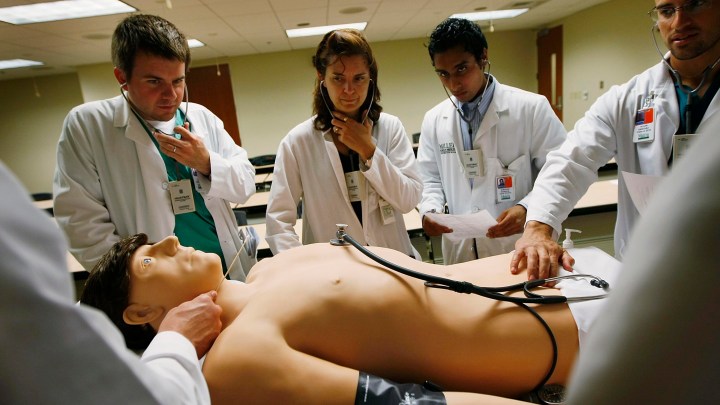
How COVID-19 could disrupt clinical rotations for med school students
How COVID-19 could disrupt clinical rotations for med school students

The Association of American Medical Colleges is the group that helps medical schools coordinate, among other things, 81,000 students currently doing clinical rotations in hospitals. The training is required and its parameters are very specific.
Yet, in some situations, hospitals and med schools might ask the students to temporarily leave.
To hear more about why and how this could happen during the COVID-19 outbreak, we spoke with John Prescott, an emergency room doctor and the chief academic officer at the Association of American Medical Colleges. The following is an edited transcript of that conversation.
David Brancaccio: I assume your association is continuing to meet on this issue and gather information as new information comes in.
Dr. John Prescott: We are meeting every single day. Internally we have something called our “rapid response team.” And we are checking into here what’s going on nationally and locally. We are working with the federal government, we are working with our teaching hospitals to figure out how to best meet the challenges that are going on with with COVID-19.
Brancaccio: Might some of the hospitals ask the students to leave temporarily? Or might some of the medical schools be interested in withdrawing their students temporarily, depending on the situation on the ground involving coronavirus?
Prescott: Yes, that could happen. Students could be asked not to attend certain clinical rotations because of several factors. One might be the lack of personal protective equipment, which is essential for for their safety, and that’s been an issue that we’re starting to hear more about. A second thing may be that the team is so busy taking care of patients, that they may not have enough time to teach the students. But the students get training early on in how to keep themselves safe. I mean, the guidelines that the CDC put out are things that students learn early on in their medical education. I mean, this is this is what we do.
Brancaccio: Medical schools get accreditation. You’re making changes to your approach to some of this training in the face of the coronavirus. Is there a danger that schools could run afoul of the promises they make under accreditation?
Prescott: Our accrediting body, the Liaison Committee on Medical Education, has been reaching out to our medical schools, and likewise, medical schools have been reaching out to the LCME, so that they don’t run afoul. Really what the whole goal of accreditation is, is to assure the public that the graduates of medical education programs are going to be good doctors, even as we are confronting the challenges of COVID-19.
There’s a lot happening in the world. Through it all, Marketplace is here for you.
You rely on Marketplace to break down the world’s events and tell you how it affects you in a fact-based, approachable way. We rely on your financial support to keep making that possible.
Your donation today powers the independent journalism that you rely on. For just $5/month, you can help sustain Marketplace so we can keep reporting on the things that matter to you.












